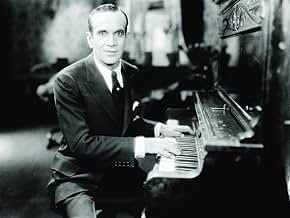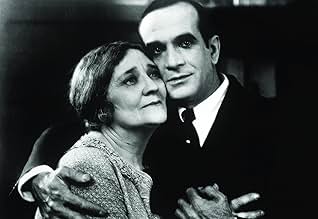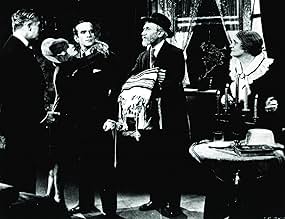El hijo de un cantor judío debe desafiar las tradiciones de su padre religioso para perseguir su sueño de convertirse en cantante de jazz.El hijo de un cantor judío debe desafiar las tradiciones de su padre religioso para perseguir su sueño de convertirse en cantante de jazz.El hijo de un cantor judío debe desafiar las tradiciones de su padre religioso para perseguir su sueño de convertirse en cantante de jazz.
- Dirección
- Guionistas
- Elenco
- Nominado a 1 premio Óscar
- 3 premios ganados y 1 nominación en total
- Jakie Rabinowitz - Age 13
- (as Bobby Gordon)
- Cantor Rosenblatt - Concert Recital
- (as Cantor Joseff Rosenblatt)
- Chorus Girl
- (sin créditos)
- Chorus Girl
- (sin créditos)
- Small Part
- (sin créditos)
- Choreographer - 'April Follies'
- (sin créditos)
- Small Part
- (sin créditos)
- Violinist
- (sin créditos)
- Small Part
- (sin créditos)
- Buster Billings
- (sin créditos)
- Dance Director
- (sin créditos)
Opiniones destacadas
I have great difficulty in understanding the comments listed in the posts of how today's human rights standards can be applied to a film that was created 80 years ago.
We are talking about 1927,and it is hard for me to understand how today's negative comments are made about the Black-face and other racial comments. This was a convention of the time 80 years ago. I do not for a moment agree that the way minorities were treated was correct, but that was 1927, not now! You cannot erase history to make it fit today's standards.
I thought Al Jolson did a superb job in his singing,dialog,and acting in this film for the era. One would need to review and compare the singing and acting styles,that of other performers of the era and make comparisons. Crosby, Sinatra, Eddie Fisher, even Elvis Presley & Jackie Wilson said that Al Jolson was a great influence on their careers. To say he could not sing as in some posts here, is absurd.
The love interest here is so unusual. He does fall in love with a pretty dancer, but tells her plainly that his career is more important than she is. She later doesn't become part of the choice as would be the case in nearly every other script instead she becomes part of the audience, presenting the dramatic quandary: the stage or God.
The presentation of religion is unique in my experience. Everyone here is a Jew, except the performers. They are the "real" and everyone else is "pretend," performing. Though there are many opportunities to fall into obnoxious stereotypes, its avoided over and over. That's despite the dozens of examples they had before.
In fact, there's an amazing engineering of story here. As any viewer will know, this was the first talkie. It was new, and to emphasize its newness a story was created to emphasize the contrast between old and new.
This film is part silent, part "talkie." It shows a struggle between the old (obviously obsolete) and the vital young. It also depicts in a rather subtle but effective way the "old" god, and the new: there's plenty of talk about the performance hall being a modern church. The music as well: we have the implication that it is not only the setting, the performer and the calling, but the music itself that is something new.
Along the way we get street scenes of the Jewish area of New York. These are genuine street scenes and are absolutely phenomenal: there isn't anything I know that compares. There was an attempt of sorts in "The Pawnbroker," which by itself was strong. But nothing compared to this.
Ted's Evaluation -- 4 of 3: Every cineliterate person should experience this.
I'd like to comment on someone else's comments now. Someone said this movie was very racist and that's why it was successful, saying, "Would this film have still been successful if it was just Jolson as himself and not black-faced? Probably not. That's because people watched it to make themselves feel better about themselves."
I wonder if this commenter actually saw the movie. Jolson is only wearing blackface for about 15 minutes for a performance. The rest of the movie, Jolson IS himself. Jolson never plays an African-American as his character in the movie, he just sings a song as one. Yes, the song is somewhat racist by today's standards, but most of this comment is not valid at all. In fact, I suspect the comment was written solely based on a glance at the video box cover.
Anyway, if you wanna see a historical landmark in film or if you wanna see a fabulous movie (half-talkie, half-silent), go ahead and see "The Jazz Singer."
If ever you want to get a real kick see this movie, if you can find a viewable copy, and revel in the historical significance of it. Also take out your copy, or pick up Singing In The Rain, which pays homage to the advent of talking pictures. Although they goof with the characters, such as the voice of Lina Lamont, the very real challenges of transitioning from a silent world to a talkie world is very evident.
This is a powerful story with interesting characters and good songs, to boot. It was different to see Warner Oland as somebody else besides Charlie Chan. He played Jolson's father and I never would have recognized him had I not read the credits. Nor would I have recognized William Demarest.
Jolson, however, is the man who dominates the film. Some of this songs wound up being classics, ones played for years and years, such as "Toot, Toot Toosie" and "Mammy."
Faced with a very tough decision on what to do with his life, Jolson's character does the right thing in the end, which was nice to see. Overall, it's entertaining.
¿Sabías que…?
- TriviaThis is the first feature-length movie with audible dialogue.
- ErroresMary recieves a telegram dated August 8, 1927. Later in the film, Jack is seen writing a letter to Mary, dating it August 7, 1927.
- Citas
[opening lines, first quote and first words in the first widely-seen talking picture]
Jack Robin: Wait a minute, wait a minute, you ain't heard nothin' yet! Wait a minute, I tell ya! You ain't heard nothin'! You wanna hear "Toot, Toot, Tootsie"? All right, hold on, hold on...
[then he walks back to one of the band members]
Jack Robin: Lou, listen. Play "Toot, Toot, Tootsie", three chorus, you understand. In the third chorus, I whistle. Now give it to 'em hard and heavy, go right ahead.
- ConexionesEdited into Okay for Sound (1946)
- Bandas sonorasMy Gal Sal
(1905) (uncredited)
Written by Paul Dresser
Sung by Robert Gordon (dubbed by an unidentified singer)
Selecciones populares
Detalles
Taquilla
- Presupuesto
- USD 422,000 (estimado)
- Tiempo de ejecución
- 1h 28min(88 min)
- Color
- Relación de aspecto
- 1.33 : 1






























